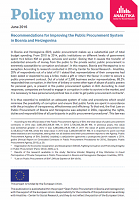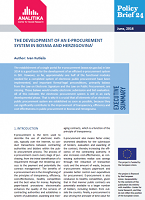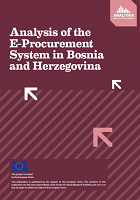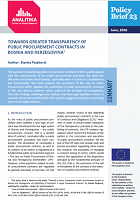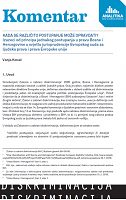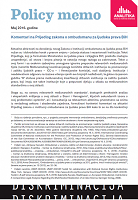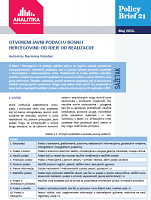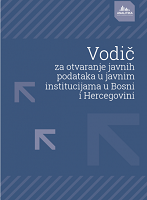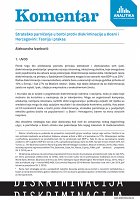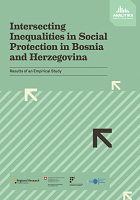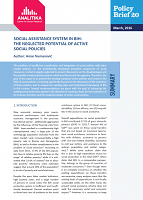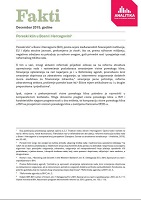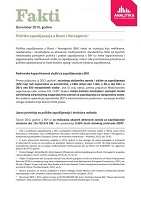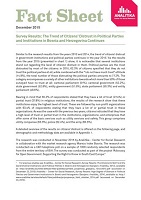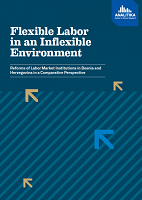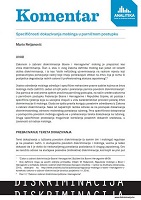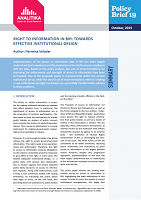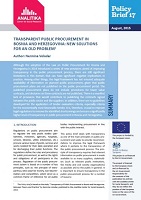Strateško parničenje u borbi protiv diskriminacije u Bosni i Hercegovini: Teorija i praksa
Author(s): Aleksandra Ivanković / Language(s): Bosnian
Keywords: BiH; strategic litigation; discrimination; theory; practice; courts;
Pored toga što predstavlja povredu principa jednakosti i dostojanstva svih ljudi, diskriminacija predstavlja i prepreku razvoju otvorenog, inkluzivnog društva, koje omogućava svim pojedincima da ostvare svoje potencijale. Diskriminacija zaista košta. Ukidanjem rasne diskriminacije, na primjer, u Sjedinjenim Državama mogao bi se ostvariti rast BDP-a za 20%. Rodna diskriminacija i neuravnoteženo učešće žena u ekonomiji uzrokuje gubitke prihoda od 10% u Evropi, i čak 27% na Bliskom istoku. Dakle, nije teško dokazati da se diskriminacija zaista ne isplati. Ipak, i dalje je sveprisutna u svakodnevnom životu. I ma kako da je svijest o pogrešnosti diskriminacije raširena i razvijena, malo je alata koje možemo da koristimo u nastojanju da je iskorijenimo. Mogu se organizovati kampanje, edukacije, razmjene iskustava, različiti oblici zagovaranja i podizanja svijesti. Ali rijetka su sredstva koja mogu da daju opipljive rezultate i da obezbijede konkretnu zaštitu. Kao jedan od tih konkretnih alata u borbi protiv diskriminacije, strateško parničenje je u posljednjih nekoliko godina dobilo na popularnosti i u Bosni i Hercegovini, barem na nivou stručnih rasprava. Ako shvatimo strategiju kao plan djelovanja koji vodi do ostvarenja nekog dugoročnog cilja, a parničenje u širem smislu kao pokretanje bilo kojeg zakonom ili međunarodnim aktom predviđenog postupka, onda strateško parničenje kao pristup predstavlja primjenu induktivnog metoda u ostvarenju društvene promjene. Naime, u iniciranju promjene od pojedinačnog ka opštem, jedan predmet će, pažljivim biranjem klijenta, argumenata i organa pred kojima će se postupak voditi, u dugoročnom periodu dovesti do željene transformacije u društvu. Shvaćeno kao legitimno sredstvo za postizanje legitimnih ciljeva, strateško parničenje se razvilo u anglosaksonskoj pravnoj tradiciji kao odgovor na velike izazove društva 20-og vijeka: diskriminaciju i zaštitu životne sredine. I mada je u anglosaksonskoj pravnoj tradiciji, u kojoj je presuda sama po sebi izvor prava, lakše bilo postići da se standardi iz jedne presude uvedu u pravni poredak kao pravilo koje valja primijeniti u svim sljedećim sličnim slučajevima, sama ideja je prenesena u kontinentalnu Evropu sa dosta uspjeha. Ne treba ići daleko da bi se identifikovali predmeti strateške litigacije u kontinentalnoj tradiciji. U mnogim evropskim zemljama, poput, na primjer, Njemačke, brojne su presude u kojima se utvrđuje diskriminacija nad ženama ili etničkim manjinama. Kod prve grupe obično se radi o pravima iz radnog odnosa, a kod druge o oblasti stanovanja. Praksa Evropskog suda za ljudska prava obiluje strateškim predmetima kojima se potvrđuju prava lica sa invaliditetom, žena, nacionalnih manjina. Vrlo svjež primjer strateške litigacije je i presuda koja je potvrdila da i u Hrvatskoj, koja je nejednakost istopolnih partnera referendumom uvela u Ustav, istopolni partneri, premda nemaju pravo na brak, imaju pravo na porodični život. Ovom uspjehu je prilično doprinijela i činjenica da je Evropski sud za ljudska prava, kao vrhovni autoritet u tumačenju evropskih ljudskih prava, začet na načelima precedenta i da, bar u teoriji, presuda donesena u jednom predmetu protiv bilo koje od 47 članica, ima da se, mutatis mutandis, prenese i primijeni u svih preostalih 46 država. Naravno, za stranke koje su uključene u postupak, svaka je parnica strateška. Ipak, sama gola suma strategije i parnice ne čini parničenje strateškim. Neophodno je u računicu dodati i elemenat opšteg dobra, odnosno zajedničkog cilja kojem teži određena društvena snaga. Tako shvaćena strateška parnica je donijela značajne uspjehe u posljednjih nekoliko decenija. Presudom u predmetu Brown protiv Odbora obrazovanja, ukinuta je rasna segregacija u američkim školama, Erin Brockowich je zaustavila zagađenje vode u Hinkleyu, a u Bugarskoj je pokrenuta promjena pravnog sistema starateljstva i lišenja poslovne sposobnosti kao posljedica presude Evropskog suda za ljudska prava u predmetu Stanev protiv Bugarske. Ipak, čini se da su prepreke za uspjeh strateškog parničenja brojne, a nevjerne Tome će reći čak i nepremostive. Što je veće društveno zlo protiv kojeg se borimo, na primjer podređenost žena u društvu, biće potreban veći društveni pokret da ga iskorijeni. A kako je zlo protiv kojeg je borba usmjerena toliko ukorijenjeno, mnogima postaje nevidljivo i “normalizovano”, te borba protiv njega za mnoge postaje ne samo nepotrebna, nego i opasna po postojeće vrijednosti. Druga prepreka je u lingvističkim ograničenjima. Naime, i kad parničenje dovede do naoko dobrog rezultata, često je na drugima da tumače izreku suda. A ti drugi su skloni da tumačenjem rezultat razvodne do beskorisnosti. U skladu s tim, postavlja se pitanje da li je entuzijazam s kojim se u Bosni i Hercegovini prišlo strateškom parničenju opravdan.
More...
